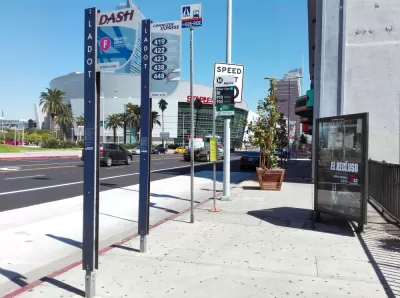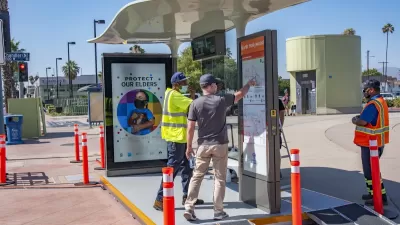Bus riders in Los Angeles frequently lack protection from sun and extreme heat, with bus stops in some of the county’s hottest areas having the worst amenities.

If you’ve taken a bus in Los Angeles, chances are you’ve noticed a few desolate bus stops that lack shelters, seating, or nearby trees to offer protection from extreme heat, rain, or wind. Dan Zukowski describes the situation in Smart Cities Dive, referencing a new study from the University of California, Los Angeles, Lewis Center for Regional Policy Studies that reveals that only 26 percent of Los Angeles County bus stops have shelters.
The problem isn’t unique to the City of Angels: “According to data compiled by the Washington Post last year, less than 20% of more than 122,000 bus stops in use by 16 large U.S. transit agencies have bus shelters.”
As Zukowski explains, “Typically, local jurisdictions, not transit agencies, are responsible for installing and maintaining bus shelters, according to the report. That means that some cities will have substantially higher numbers of shelters while others will have relatively few.” The Lewis Center study noted that in Los Angeles County, “neighborhoods with high Latino populations average temperatures that are four degrees warmer than those with low Latino populations and that ‘extreme heat days are warmer in neighborhoods with more Black residents than those with fewer Black residents.’”
As extreme heat becomes more common, the study’s authors write, “government partners will need to prioritize where new shelters are installed and consider how to maximize their benefits.”
FULL STORY: Most Los Angeles County bus stops lack protection from extreme heat

Alabama: Trump Terminates Settlements for Black Communities Harmed By Raw Sewage
Trump deemed the landmark civil rights agreement “illegal DEI and environmental justice policy.”

Study: Maui’s Plan to Convert Vacation Rentals to Long-Term Housing Could Cause Nearly $1 Billion Economic Loss
The plan would reduce visitor accommodation by 25% resulting in 1,900 jobs lost.

Planetizen Federal Action Tracker
A weekly monitor of how Trump’s orders and actions are impacting planners and planning in America.

Wind Energy on the Rise Despite Federal Policy Reversal
The Trump administration is revoking federal support for renewable energy, but demand for new projects continues unabated.

Passengers Flock to Caltrain After Electrification
The new electric trains are running faster and more reliably, leading to strong ridership growth on the Bay Area rail system.

Texas Churches Rally Behind ‘Yes in God’s Back Yard’ Legislation
Religious leaders want the state to reduce zoning regulations to streamline leasing church-owned land to housing developers.
Urban Design for Planners 1: Software Tools
This six-course series explores essential urban design concepts using open source software and equips planners with the tools they need to participate fully in the urban design process.
Planning for Universal Design
Learn the tools for implementing Universal Design in planning regulations.
Caltrans
Smith Gee Studio
Institute for Housing and Urban Development Studies (IHS)
City of Grandview
Harvard GSD Executive Education
Toledo-Lucas County Plan Commissions
Salt Lake City
NYU Wagner Graduate School of Public Service





























